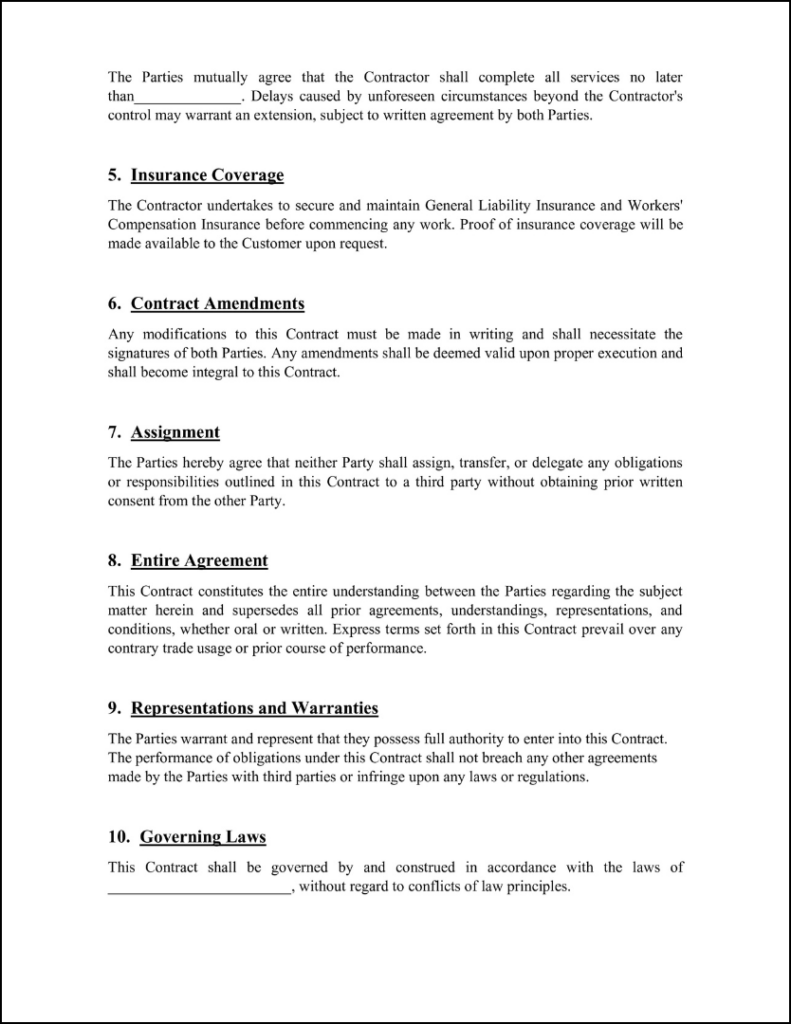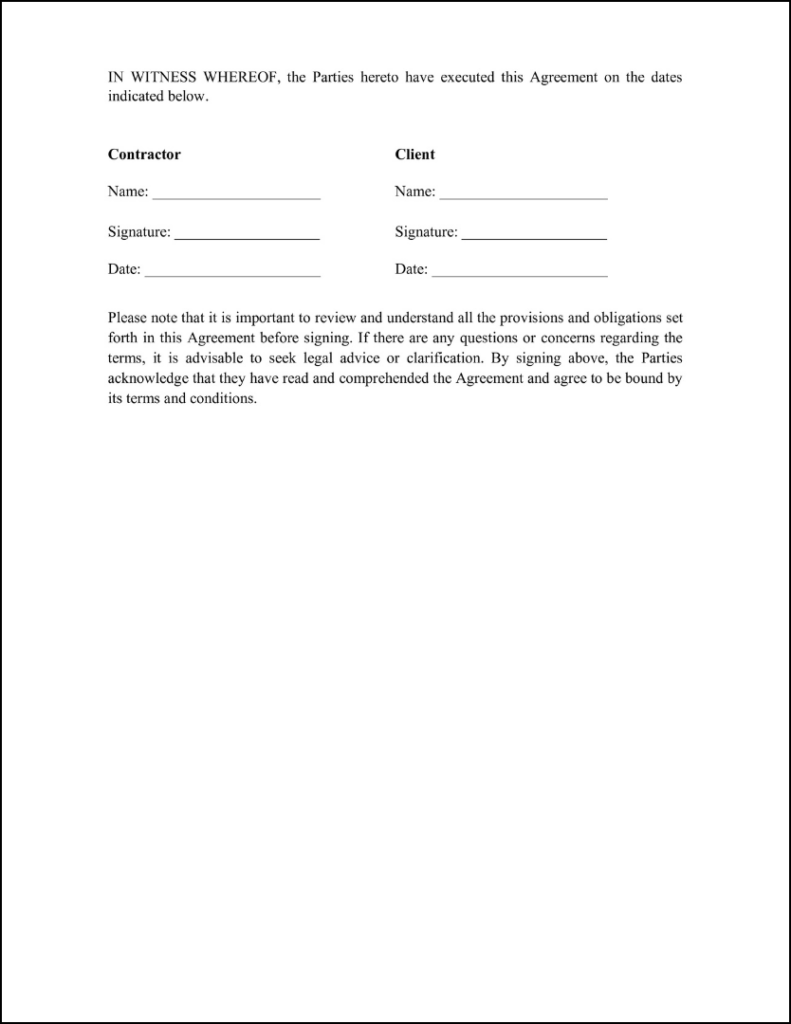
When it comes to undertaking a roofing project, having a clear and detailed contract is crucial for both contractors and homeowners. A roofing contract serves as a legally binding agreement that outlines the terms and conditions of the project, protecting the interests of all parties involved. Don’t miss out on this opportunity to streamline your roofing project. Our free roofing contract template is designed to save you time and effort, ensuring that all the critical aspects of the agreement are covered.
From project timelines to payment terms, the template provides a clear and concise structure that will help you avoid any potential misunderstandings and disputes down the road. Take the first step towards a seamless roofing project by downloading our template now!


A legally binding document outlining the terms and conditions of the agreement between a roofing contractor and their client is known as a roofing contract. This essential agreement serves as a roadmap for the entire roofing project, providing clarity on various aspects to ensure both parties are on the same page and understand their respective roles and responsibilities. A comprehensive roofing contract typically covers the following aspects:
Access our free Roofing Contract sample to safeguard your interests. Download now and take proactive steps toward a secure Roofing Contract at no cost.
Using a roofing contract template is a wise choice whenever you’re embarking on a roofing project, regardless of its scale or complexity. Whether you’re a professional roofing contractor or a homeowner seeking roofing services, having a well-structured and clearly defined agreement in writing is essential to ensure a smooth and successful project. Here are some scenarios where using a roofing contract template is highly recommended:
If you’re a roofing contractor, a roofing contract template is an indispensable tool for establishing a professional relationship with your clients. It outlines the terms and conditions of the project, sets clear expectations, and helps avoid misunderstandings or disputes during and after the completion of the work.
As a homeowner, hiring a roofing contractor can be a significant investment. Using a roofing contract template ensures that you have a formal agreement in place, safeguarding your interests and protecting you from potential liabilities. With a well-crafted contract, you can confidently move forward with the roofing project, knowing that all critical aspects are covered.
For roofing projects that involve multiple phases, extensive repairs, or installations of intricate roofing systems, a roofing contract template is invaluable. It allows you to detail each step of the project and define specific deliverables, ensuring that both parties are aware of their responsibilities.
Whether you’re a contractor or a homeowner, a new roof installation or replacement is a substantial undertaking. A roofing contract template enables you to outline the project’s scope, the type of roofing materials to be used, and the timeline for completion.
When engaging a roofing contractor for repairs or maintenance services, a roofing contract template ensures that the specifics of the job are clearly defined. This includes identifying the areas to be repaired, the materials to be used, and the expected results.
Having a written contract helps protect both parties in case of unforeseen circumstances or disagreements during the project. It serves as a reference document in case legal action becomes necessary, saving time, money, and stress for all involved.
Utilizing a roofing contract template promotes transparent communication between the contractor and the client. By discussing and agreeing upon the terms upfront, everyone involved has a clear understanding of what is expected, reducing the likelihood of misunderstandings or miscommunication.
The contract clearly outlines the total cost of the roofing project and the payment schedule. This allows both parties to plan and budget accordingly, ensuring a smooth flow of finances throughout the project.
Creating a roofing contract that is clear, comprehensive, and legally sound is crucial for a successful roofing project. Whether you’re a professional roofing contractor or a homeowner hiring roofing services, following these best practices will help you draft a robust and reliable roofing contract:
Use straightforward language and avoid ambiguous terms or jargon. Clearly outline the scope of work, including the type of roofing materials to be used, the colors, and any specific design or style preferences. The more specific and detailed the contract, the less room there is for misunderstandings.
Clearly state the total cost of the project and provide a breakdown of the payment schedule. Specify the deposit amount required upfront, as well as when progress payments are due. Having a transparent payment plan fosters trust and ensures financial expectations are met.
It’s common for roofing projects to encounter changes or unforeseen circumstances. Include a provision in the contract that addresses how change orders will be handled. Outline the process for requesting changes, the associated costs, and the impact on the project timeline.
Provide a realistic start date and estimated completion date for the roofing project. Consider potential weather-related delays and other factors that may affect the timeline. Being transparent about the project duration helps manage expectations and builds trust with the client.
Ensure that the roofing contractor carries both liability insurance and workers’ compensation coverage. Request proof of insurance and clearly state the insurance requirements in the contract. This protects both parties in the event of accidents or damages during the project.
Specify any warranties or guarantees on the workmanship and roofing materials used in the project. Clearly outline the duration and coverage of these warranties, providing reassurance to the client about the quality of the work.
While everyone hopes for a smooth project, disputes may still arise. Include a clear and fair dispute resolution clause in the contract, outlining the steps to be taken in case of disagreements. This can help avoid costly legal battles and encourage amicable resolution.
Ensure that all necessary permits and licenses are obtained before starting the roofing project. Clearly state the responsibility for acquiring these documents in the contract. To avoid issues with the law, local regulations must be followed.
Include a section that outlines the process for resolving disputes that may arise during the project. This can include mediation or arbitration, providing an alternative to costly and time-consuming legal proceedings.
Before signing, ensure that both parties thoroughly review the contract. If necessary, explain any legal terms or complex clauses to ensure mutual understanding and agreement.
Organize the contract using subheadings and bullet points to make it easier to read and comprehend. A well-structured contract enhances readability and reduces the chances of misinterpretation.
By adhering to these best practices, you can create a well-crafted and legally sound roofing contract that serves as a reliable guide throughout the roofing project. Remember, a well-written contract is not only a protection mechanism; it also promotes open communication and fosters a positive working relationship between the roofing contractor and the homeowner.